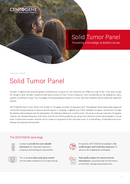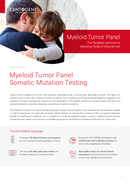Somatic Mutation Testing
Testing for the presence of cancer requires the utmost personal care and consideration. Somatic mutation testing is enormously beneficial for improving the prognosis and the quality of life of cancer-affected patients. Our team of hereditary and somatic cancer experts will support you during every step of the process.
Identifying Somatic Mutations for Tumor Profiling
Every cancer cell can evolve its own pattern of mutated genes.
Each person's cancer, and even parts of a single tumor, can become completely unique. This has implications with respect to diagnosis, prognosis and treatment response. The presence of recurrent somatic mutations allows us to create a detailed molecular fingerprint of the tumor and to identify important tumor subtypes.
How Can Somatic Genetic Testing Help Patient Care?
Somatic mutation analysis is a standard of practice for tumors in order to identify therapeutic sensitizing and resistance mutations. This allows a finer assessment of the diagnosis and prognosis and targeted therapies directed towards the individual patients tumor profile.
What Do We Know About Somatic Mutations?
Cancer is one of the leading causes of morbidity and mortality worldwide. Cancer can be the result of a genetic predisposition that is inherited from family members (germline (hereditary) gene mutation) or it can be the result of the acquired mutations accumulated during a lifetime (somatic (acquired) mutation).
Unlike regular cells, cancer cells do not experience physiological elimination of “programmed cell death” or “apoptosis”; instead they continue to grow and divide. Tumor cells show uncontrolled proliferation if there are mutations in the genes involved in cell division .

Somatic Mutation Testing for Myeloid Tumors
Genetic testing of myeloid tumors can help you make accurate diagnoses, provide prognoses, choose appropriate therapy and counsel patients
Note
Hotspot targeted mutation testing is unavailable in the US for the following mutations: BRAF c.1799T>A p.V600E, EGFR c.2573T>G, p.L858R, KRAS c.35G>A, p.G12D, KRAS c.38G>A, p.G13D, KRAS c.35G>T p.G12V, NRAS c.181C>A p.Q61K, NRAS c.34G>T, p.G12C, NRAS c.35G>A, p.G12D, NRAS c.182A>G, p.Q61R.
Resources
Useful Links
Downloads

Solid Tumor Panel – Product Sheet
Providing knowledge to battle cancer

Myeloid Tumor Panel – Product Sheet
The targeted approach to detecting myeloid malignancies
Scientific Publications
Novel Genotype-Phenotype Association with Wide-Ranging Implications
Cystic fibrosis (CF) is the most prevalent autosomal recessive genetic disorder; it has been assumed to be genetically homogeneous. Researchers at CENTOGENE, however, have now identified a second CF […]
Related Webinars
Gaucher Disease – Update on diagnosing and therapy monitoring
Knowing Gaucher Disease (GD), the most common lysosomal storage disorder, is crucial when being faced with unspecific abnormalities in many organs like brain, liver, spleen and bones. Right at […]
Enfermedad de Gaucher – Enfoque en el diagnóstico y seguimiento de la terapia
Conocer la enfermedad de Gaucher (EG), el trastorno de almacenamiento lisosomal más común, es crucial cuando su paciente presenta anormalidades inespecíficas en diversos órganos como cerebro, hígado, […]
Genome First. Last. Fast: the One Step Approach to Genetic Testing
This webinar will cover the opportunities and challenges with clinical Whole Genome Sequencing (cWGS), value of curated digital data, re-classification and re-analysis and the utility of cWGS
Get in Touch With Our Customer Support
Our consultation service is available in several languages.
+49 (0) 381 80 113 - 416
Mon. – Fri. 8 a.m. – 6:30 p.m. CET
For Spanish and Portuguese Partners:
